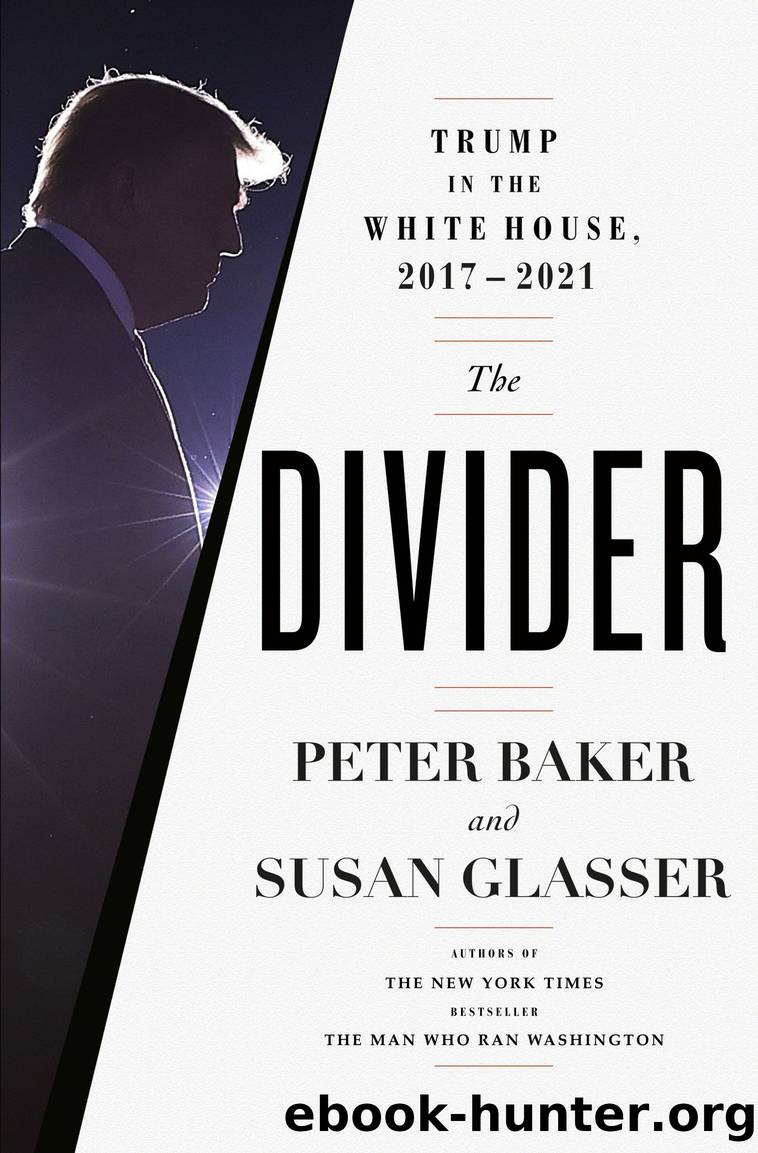The Divider by Peter Baker & Susan Glasser

Author:Peter Baker & Susan Glasser [Baker, Peter & Glasser, Susan]
Language: eng
Format: epub
Publisher: Knopf Doubleday Publishing Group
Published: 2022-09-20T00:00:00+00:00
* * *
â
On December 18, 2019, Donald Trump became only the third president impeached by the House of Representativesâand the first to live-tweet his own impeachment. A few days earlier, on a Sunday with nothing much else to do, he had broken his single-day record for tweeting during his presidency, sending out 105 tweets, many of them concerning the âwitch huntâ that would permanently mark historyâs account of his tenure. Four days later, as the Judiciary Committee marked up the articles to send them to the floor, he easily surpassed the record he had just set, hitting ninety tweets before noon and 123 by the end of the day. It was all âvery sad,â he complained. On the day itself, Trump sent out four dozen tweets and retweets that made it clear he was furious about the permanent blot on his record. Impeachment, he said, was âAN ASSAULT ON AMERICA, AND AN ASSAULT ON THE REPUBLICAN PARTY!!!!â
âHe feels like heâs been treated unfairly,â Lindsey Graham complained on Trumpâs behalf, after having spoken with him on the phone. âItâs been a never-ending effort to undermine his presidency.â[46] But Trump had in many ways succeeded where it mattered most, following Grahamâs counsel and sticking close to Bill Clintonâs playbookâat least in part. Unlike Clinton, Trump had no intention of apologizing, and no ability even to pretend he was focusing on work while enemies persecuted him. But he and his allies had kept it partisan just as Clinton had done, and in doing so persuaded even many Republicans concerned about Trumpâs blackmail of a beleaguered ally to disregard their qualms and stick to their camp. Partisanship was a powerful drug; in Trumpâs Washington, it was the intoxicant of choice.
No one better illustrated this than Adam Kinzinger, a congressman from Illinois who refused to endorse Trump in 2016 and selectively condemned Trumpâs various outrages during his first couple years in office when others would not. A national security hawk who had served in Afghanistan and Iraq, Kinzinger was always at the top of the list of Republicans who might consider voting for Trumpâs impeachment. If he did not go for it, none would.
And when the time came that December, he did not go for it. âI had an openness to vote for it,â Kinzinger acknowledged much later. But the easier course was to follow the rest of the Republican Conference. âI wanted a reason to vote against it,â he recalled. Trumpâs lawyers and the Republicans on the House Intelligence Committee had worked all fall to provide one, attacking the process as partisan, rushed, and incomplete. Kinzinger accepted the exit ramp that had been prepared for him and others like him. Where were key witnesses? Fuller hearings? The Democrats were not playing fair. âIt became a rush job,â Kinzinger said, which was an excuse, âthe excuse,â Kinzinger admitted, that he had been looking for.
On the day itself, Kinzinger made no speeches about impeachment. He just went to the floor and voted no, then released a statement that had not a single critical word of Trump.
Download
This site does not store any files on its server. We only index and link to content provided by other sites. Please contact the content providers to delete copyright contents if any and email us, we'll remove relevant links or contents immediately.
| U.K. Prime Ministers | U.S. Presidents |
Waking Up in Heaven: A True Story of Brokenness, Heaven, and Life Again by McVea Crystal & Tresniowski Alex(37808)
Empire of the Sikhs by Patwant Singh(23084)
We're Going to Need More Wine by Gabrielle Union(19046)
Hans Sturm: A Soldier's Odyssey on the Eastern Front by Gordon Williamson(18590)
Leonardo da Vinci by Walter Isaacson(13336)
The Radium Girls by Kate Moore(12028)
Tools of Titans by Timothy Ferriss(8394)
Educated by Tara Westover(8054)
How to Be a Bawse: A Guide to Conquering Life by Lilly Singh(7486)
Permanent Record by Edward Snowden(5847)
The Last Black Unicorn by Tiffany Haddish(5635)
The Rise and Fall of Senator Joe McCarthy by James Cross Giblin(5280)
Promise Me, Dad by Joe Biden(5153)
The Wind in My Hair by Masih Alinejad(5095)
A Higher Loyalty: Truth, Lies, and Leadership by James Comey(4962)
The Crown by Robert Lacey(4814)
The Iron Duke by The Iron Duke(4354)
Joan of Arc by Mary Gordon(4110)
Stalin by Stephen Kotkin(3965)
